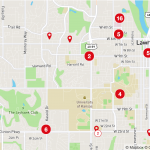Healthy Outlook: Who’s buying your doctor lunch?

photo by: OpenPaymentsData.CMS.gov
This map depicts doctors around Lawrence who have received some form of payment from pharmaceutical companies. The data is available through OpenPaymentsData.CMS.gov.
Check, please — that is, go online to check out what small or not-so-small payments your health care providers have received from pharmaceutical companies, please.
A February 2019 article in The Atlantic, “Did Free Pens Cause the Opioid Crisis?” by Ray Fisman and Michael Luca, examines how even small gifts — a free pen here, a sandwich there — can spark an urge to reciprocate.
Some physicians receive hundreds or thousands of dollars from pharmaceutical companies to speak at events or venues. Those payments are often accompanied by additional costs for travel, lodging, and so on. And, of course, many doctors are paid for research. But it’s not just the top-dollar payments that might drive your MD’s choice of Rx.
A study published in the journal JAMA Internal Medicine in June 2016 found that “Receipt of industry-sponsored meals was associated with an increased rate of prescribing the promoted brand-name medication to Medicare patients.”

The study — “Pharmaceutical Industry-Sponsored Meals and Physician Prescribing Patterns for Medicare Beneficiaries” — looked at nearly 280,000 physicians. Those who received a meal with a mean value of less than $20 were more likely to prescribe brand-name statins, blood pressure medications, antidepressants and more.
To put it in perspective, take AstraZeneca Pharmaceuticals LP. Some of its biggest-name drugs are Nexium, Crestor, Seroquel and Symbicort. In 2017, it spent $9.6 million in food and beverage payments alone. That amount was for 415,482 individual payments, or an average of $23 each. GlaxoSmithKline LLC, maker of drugs such as Lamictal, Levitra and Wellbutrin, spent $5.2 million on 332,346 individual food and beverage payments — an average of about $15.50 apiece.
There’s a reason these companies spend millions each year on these efforts. They wouldn’t do it if it didn’t work. And the inverse is true: As The Atlantic’s article points out, a 2017 JAMA study found that drugs lost 1.67% in market share when pharma reps’ visits were regulated and small gifts were banned for a period.
But as a patient, you have a right to know who’s picking up the checks for your health care providers. You can find out at OpenPaymentsData.CMS.gov.
The Open Payments Data website went online in 2013, and it currently lists data through 2017. It’s a product of the Centers for Medicare and Medicaid Services, and its purpose is to increase transparency in the health care system.
Naturally, not all lunches are reasonably priced. Here in Lawrence, in 2017, there were 37 individual food and beverage payments to providers valued at $100 or more. That’s a lot of fried chicken.
Some data points are more transparent than others — for instance, some food and beverage payments have notes next to them, such as “Related to product discussion”; “Informational meal”; “Educational program”.
Providers also have to disclose their investments. Based on the website’s “Query Builder” feature, no providers in Lawrence are receiving any royalties from drug companies, nor are any receiving interest from current or prospective ownerships. Elsewhere in the nation, however, some are making millions.
It’s not my job to judge what’s right and wrong. But if my doctor were making — or eating — more than I make in a month on a drug company’s dime while I was scraping pennies together to pay for my brand-name prescription, I’d want to ask some questions.
About Healthy Outlook
Healthy Outlook is a column written by Journal-World reporter and Health section editor Mackenzie Clark, in hopes of helping readers make their lives a little bit happier, healthier and more active.
Have questions about the world of health and wellness in Lawrence, or a health story idea? Contact Mackenzie:
- • mclark@ljworld.com
- • 785-832-7198
- • Facebook/Facebook messenger: mclarkljw
- • Twitter: @mclark_ljw
- • Instagram: @mclark_ljw
Read more:






